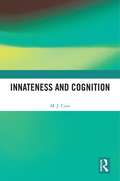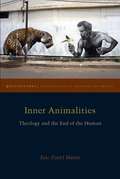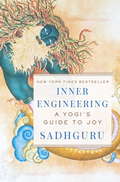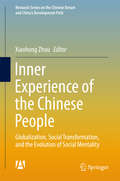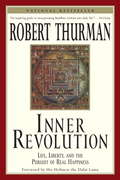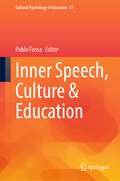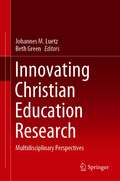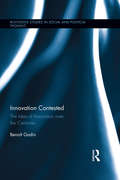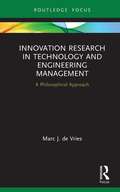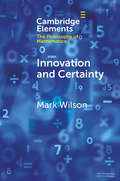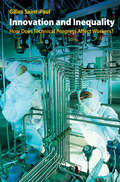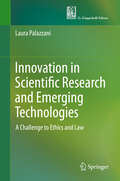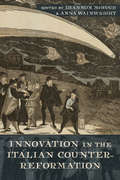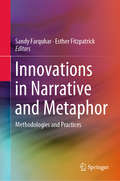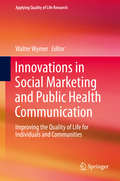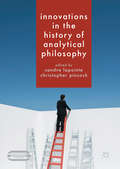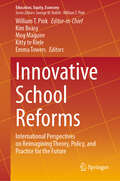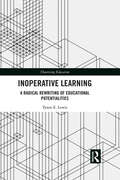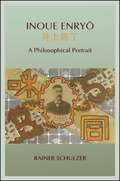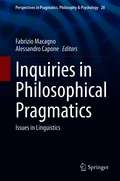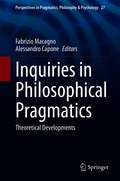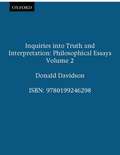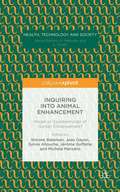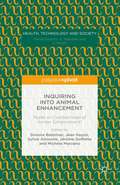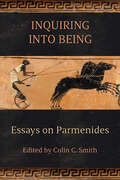- Table View
- List View
Innateness and Cognition
by M. J. CainThe question of innateness, or nativism, is one of the most heated problems in philosophy, reaching as far back as Plato but generating fierce debates in contemporary philosophy and cognitive science. Which aspects of the human mind are innate and which are the products of experience? Do we have any innate concepts or knowledge or are all the contents of the mind acquired by means of learning? Innateness and Cognition is a much-needed overview of this important problem. Through addressing the following topics M.J. Cain argues for a nativist perspective which, nevertheless, finds an important role for culture and social learning in cognitive development: the nature of innateness the coherence and explanatory value of the concept of innateness the acquisition of concepts and the role of learning in conceptual development domain specific knowledge, including the 'massive modularity' thesis and the theory of core knowledge domains cognitive development relating the theory of mind and mathematics the relationship between biological and cultural evolution and their respective roles in cognitive development language and innateness, particularly Chomsky's linguistic nativism and challenges to this morality, moral judgment, and innateness. Innateness and Cognition is an excellent resource for those researching and studying philosophy of psychology and philosophy of mind, as well as those interested in foundational issues in cognitive science, psychology, linguistics, and anthropology.
Inner Animalities: Theology and the End of the Human (Groundworks: Ecological Issues in Philosophy and Theology)
by Eric Daryl MeyerMost theology proceeds under the assumption that divine grace works on human beings at the points of our supposed uniqueness among earth’s creatures—our freedom, our self-awareness, our language, or our rationality. Inner Animalities turns this assumption on its head. Arguing that much theological anthropology contains a deeply anti-ecological impulse, the book draws creatively on historical and scriptural texts to imagine an account of human life centered in our creaturely commonality.The tendency to deny our own human animality leaves our self-understanding riven with contradictions, disavowals, and repressions. How are human relationships transformed when God draws us into communion through our instincts, our desires, and our bodily needs? Meyer argues that humanity’s exceptional status is not the result of divine endorsement, but a delusion of human sin. Where the work of God knits human beings back into creaturely connections, ecological degradation is no longer just a matter of bodily life and death, but a matter of ultimate significance.Bringing a theological perspective to the growing field of Critical Animal Studies, Inner Animalities puts Gregory of Nyssa and Karl Rahner in conversation with Jacques Derrida, Giorgio Agamben, Kelly Oliver, and Cary Wolfe. What results is not only a counterintuitive account of human life in relation with nonhuman neighbors, but also a new angle into ecological theology.
Inner Engineering: A Yogi's Guide to Joy
by SadhguruThought leader, visionary, philanthropist, mystic, and yogi Sadhguru presents Western readers with a time-tested path to achieving absolute well-being: the classical science of yoga.The practice of hatha yoga, as we commonly know it, is but one of eight branches of the body of knowledge that is yoga. In fact, yoga is a sophisticated system of self-empowerment that is capable of harnessing and activating inner energies in such a way that your body and mind function at their optimal capacity. It is a means to create inner situations exactly the way you want them, turning you into the architect of your own joy. A yogi lives life in this expansive state, and in this transformative book Sadhguru tells the story of his own awakening, from a boy with an unusual affinity for the natural world to a young daredevil who crossed the Indian continent on his motorcycle. He relates the moment of his enlightenment on a mountaintop in southern India, where time stood still and he emerged radically changed. Today, as the founder of Isha, an organization devoted to humanitarian causes, he lights the path for millions. The term guru, he notes, means "dispeller of darkness, someone who opens the door for you. . . . As a guru, I have no doctrine to teach, no philosophy to impart, no belief to propagate. And that is because the only solution for all the ills that plague humanity is self-transformation. Self-transformation means that nothing of the old remains. It is a dimensional shift in the way you perceive and experience life." The wisdom distilled in this accessible, profound, and engaging book offers readers time-tested tools that are fresh, alive, and radiantly new. Inner Engineering presents a revolutionary way of thinking about our agency and our humanity and the opportunity to achieve nothing less than a life of joy. Praise for Sadhguru and Inner Engineering "Contrarian and consistent, ancient and contemporary, Inner Engineering is a loving invitation to live our best lives and a profound reassurance of why and how we can."--Sir Ken Robinson, author of The Element, Finding Your Element, and Out of Our Minds: Learning to Be Creative "I am inspired by Sadhguru's capacity for joy, his exuberance for life, and the depth and breadth of his curiosity and knowledge. His book is filled with moments of wonder, awe, and intellectual challenge. I highly recommend it for anyone interested in self-transformation."--Mark Hyman, M.D., director, Cleveland Clinic Center for Functional Medicine, and New York Times bestselling author "Inner Engineering is a fascinating read of Sadhguru's insights and his teachings. If you are ready, it is a tool to help awaken your own inner intelligence, the ultimate and supreme genius that mirrors the wisdom of the cosmos."--Deepak ChopraFrom the Hardcover edition.
Inner Experience of the Chinese People
by Xiaohong ZhouThis book comprehensively explores the changes in the Chinese spiritual world from the perspective of transition and transformation. Chinese feeling, a brand-new concept corresponding to Chinese experience, refers to the vicissitudes that 1. 3 billion Chinese people have been through in their spiritual worlds. The book discusses this concept together with Chinese experience, two aspects of the transformation of the Chinese mentality that resulted from the unprecedented social changes since 1978, and which have given this unique era historical meaning and cultural values. At the same time they offer a dual perspective for understanding this great social transition. Further, the book considers what will happen if we only focus on the "Chinese Experience" while neglecting the "Chinese Feeling"; the changes the Chinese people undergo when their desires, wishes and personalities have changed China; and how their emotionally charged social mentality follow eb bs and flows of the changing society. Lastly it asks what embarrassment and frustration the population will be faced with next after the tribulations their spiritual world has already been through.
Inner Revolution
by Robert ThurmanThe New York Times calls him "America's number one Buddhist." He is the co-founder of Tibet House New York, was the first American Tibetan Buddhist monk, and has shared a thirty-five-year friendship with the Dalai Lama. Now, Robert Thurman presents his first completely original book, an introduction to Buddhism and "an inspiring guide to incorporating Buddhist wisdom into daily life" (USA Today). Written with insight, enthusiasm, and impeccable scholarship, Inner Revolution is not only a national bestseller and practical primer on one of the world's most fascinating traditions, but it is also a wide-ranging look at the course of our civilization--and how we can alter it for the better. "Part spiritual memoir, part philosophical treatise and part religious history, Thurman's book is a passionate declaration of the possibilities of renewing the world" (Publishers Weekly, starred review).
Inner Speech, Culture & Education (Cultural Psychology of Education #15)
by Pablo FossaThis book is a compilation of theoretical and empirical advances related to the phenomenon of inner speech in education, and is aimed at academics and researchers in the area of psychology, education and culture. Inner speech has been a focus of multidisciplinary interest. It is a long-standing phenomenon of study in philosophy, psychology, and anthropology. Researchers from different disciplines have turned their efforts to understand this inherent experience of being "talking to oneself". In psychology, Vygotsky managed to develop a complete description of the phenomenon, giving rise to a great line of research related to inner speech in the human experience. This book derives from an international research program, related to cultural psychology, socio-constructivism, developmental psychology and education. It opens the door for new debates and emerging ideas.
Innovating Christian Education Research: Multidisciplinary Perspectives
by Johannes M. Luetz Beth GreenThis book reformulates Christian education as an interdisciplinary and interdenominational vocation for professionals and practitioners. It speaks directly to a range of contemporary contexts with the aim of encouraging conceptual, empirical and practice-informed innovation to build the field of Christian education research. The book invites readers to probe questions concerning epistemologies, ethics, pedagogies and curricula, using multidisciplinary research approaches. By helping thinkers to believe and believers to think, the book seeks to stimulate constructive dialogue about what it means to innovate Christian education research today.Chapters are organised into three main sections. Following an introduction to the volume's guiding framework and intended contribution (Chapter 1), Part 1 features conceptual perspectives and comprises research that develops theological, philosophical and theoretical discussion of Christian education (Chapters 2-13). Part 2 encompasses empirical research that examines data to test theory, answer big questions and develop our understanding of Christian education (Chapters 14-18). Finally, Part 3 reflects on contemporary practice contexts and showcases examples of emerging research agendas in Christian education (Chapters 19-24).
Innovation Contested: The Idea of Innovation Over the Centuries (Routledge Studies in Social and Political Thought)
by Benoît GodinInnovation is everywhere. In the world of goods (technology), but also in the world of words: innovation is discussed in the scientific and technical literature, but also in the social sciences and humanities. Innovation is also a central idea in the popular imaginary, in the media and in public policy. Innovation has become the emblem of the modern society and a panacea for resolving many problems. Today, innovation is spontaneously understood as technological innovation because of its contribution to economic "progress". Yet for 2,500 years, innovation had nothing to do with economics in a positive sense. Innovation was pejorative and political. It was a contested idea in philosophy, religion, politics and social affairs. Innovation only got de-contested in the last century. This occurred gradually beginning after the French revolution. Innovation shifted from a vice to a virtue. Innovation became an instrument for achieving political and social goals. In this book, Benoît Godin lucidly examines the representations and meaning(s) of innovation over time, its diverse uses, and the contexts in which the concept emerged and changed. This history is organized around three periods or episteme: the prohibition episteme, the instrument episteme, and the value episteme.
Innovation Research in Technology and Engineering Management: A Philosophical Approach (Routledge Focus on Business and Management)
by Marc J. de VriesPhilosophy may not seem to be an obvious source to discover methods for successful product innovation management. However, this book shows that systematic reflection on the nature of product innovation management, supported by insights from the philosophy of technology, can illuminate the innovation process in technology and engineering. Presenting methodological guidelines and philosophical reflections, this book guides readers through each phase of product innovation. At each step, ideas from the philosophy of technology are translated into practical guidelines for managing these processes. The book works through the philosophical perspectives on innovation, methods in innovation design and research, and the value and ethical implications of innovation. Bridging the gap between philosophical context and practical methodologies, this book will be highly valuable for postgraduate students and academics researching and teaching innovation and philosophy of technology.
Innovation and Certainty (Elements in the Philosophy of Mathematics)
by Mark WilsonBeginning in the nineteenth century, mathematics' traditional domains of 'number and figure' became vigorously displaced by altered settings in which former verities became discarded as no longer sacrosanct. And these innovative recastings appeared everywhere, not merely within the familiar realm of the non-Euclidean geometries. How can mathematics retain its traditional status as a repository of necessary truth in the light of these revisions? The purpose of this Element is to provide a sketch of this developmental history.
Innovation and Inequality
by Gilles Saint-PaulKarl Marx predicted a world in which technical innovation would increasingly devalue and impoverish workers, but other economists thought the opposite, that it would lead to increased wages and living standards--and the economists were right. Yet in the last three decades, the market economy has been jeopardized by a worrying phenomenon: a rise in wage inequality that has left a substantial portion of the workforce worse off despite the continuing productivity growth enjoyed by the economy. Innovation and Inequality examines why. Studies have firmly established a link between this worrying trend and technical change, in particular the rise of new information technologies. In Innovation and Inequality, Gilles Saint-Paul provides a synthetic theoretical analysis of the most important mechanisms by which technical progress and innovation affect the distribution of income. He discusses the conditions under which skill-biased technical change may reduce the wages of the least skilled, and how improvements in information technology allow "superstars" to increase the scale of their activity at the expense of less talented workers. He shows how the structure of demand changes as the economy becomes wealthier, in ways that may potentially harm the poorest segments of the workforce and economy. An essential text for graduate students and an indispensable resource for researchers, Innovation and Inequality reveals how different categories of workers gain or lose from innovation, and how that gain or loss crucially depends on the nature of the innovation.
Innovation in Scientific Research and Emerging Technologies: A Challenge to Ethics and Law
by Laura PalazzaniThis book discusses the ethical and legal challenges related to innovations, with reference to both scientific research and emerging technologies. It analyzes scientific research with specific reference to experimentation, with a focus on vulnerable people (minors, women, people in developing countries), compassionate care, biobanks and ethical committees. In the context of emerging technologies, it examines the ethical and legal aspects of neuroscience, genomics, ICT, big data, biometrics, converging technologies, enhancement and robotics. The book provides conceptual tools and categories to help readers understand and acquire a critical awareness of the current debates in the field.
Innovation in the Italian Counter-Reformation (Early Modern Exchange)
by Shannon McHugh and Anna WainwrightThe enduring "black legend" of the Italian Counter-Reformation, which has held sway in both scholarly and popular culture, maintains that the Council of Trent ushered in a cultural dark age in Italy, snuffing out the spectacular creative production of the Renaissance. As a result, the decades following Trent have been mostly overlooked in Italian literary studies, in particular. The thirteen essays of Innovation in the Italian Counter-Reformation present a radical reconsideration of literary production in post-Tridentine Italy. With particular attention to the much-maligned tradition of spiritual literature, the volume’s contributors weave literary analysis together with religion, theater, art, music, science, and gender to demonstrate that the literature of this period not only merits study but is positively innovative. Contributors include such renowned critics as Virginia Cox and Amadeo Quondam, two of the leading scholars on the Italian Counter-Reformation.Distributed for UNIVERSITY OF DELAWARE PRESS
Innovations in Narrative and Metaphor: Methodologies and Practices
by Sandy Farquhar Esther FitzpatrickThis book pursues an interdisciplinary approach to open a discourse on innovative methodologies and practices associated with narrative and metaphor. Scholars from diverse fields in the humanities and social sciences report on how they use narrative and/or metaphor in their scholarship/research to arrive at new ways of seeing, thinking about and acting in the world. The book provides a range of methodological chapters for academics and practitioners alike. Each chapter discusses various aspects of the author’s transformative methodologies and practices and how they contribute to the lives of others in their field. In this regard, the authors address traditional disciplines such as history and geography, as well as professional practices such as counselling, teaching and community work.
Innovations in Social Marketing and Public Health Communication
by Walter WymerThis volume presents the most current theoretical advances in the fields of social marketing and public health communications. The volume is divided in two parts. Part 1 contains chapters pertaining to research and theory reflecting improvements and contributions to theories that help improving quality of life. It includes literature reviews, conceptual research and empirical studies on social marketing communications, models to understand individual's risky behaviors, and how to improve social interventions. The second part emphasizes applied research, consisting of best practices, applied experiments, and case studies on social marketing innovative practices with implications for quality of life.
Innovations in the History of Analytical Philosophy (Palgrave Innovations in Philosophy Ser.)
by Sandra Lapointe Christopher PincockThis book offers new perspectives on the history of analytical philosophy, surveying recent scholarship on the philosophical study of mind, language, logic and reality over the course of the last 200 years. Each chapter contributes to a broader engagement with a wider range of figures, topics and disciplines outside of philosophy than has been traditionally associated with the history of analytical philosophy. The book acquaints readers with new aspects of analytical philosophy's revolutionary past while engaging in a much needed methodological reflection. It questions the meaning associated with talk of 'analytic' philosophy and offers new perspective on its development. It offers original studies on a range of topics - including in the philosophy of language and mind, logic, metaphysics and the philosophy of mathematics - and figures whose relevance, when they is not already established as in the case of Russell, Moore and Wittgenstein, are just now beginning to become the topic of mainstream literature: Franz Brentano, William James, Susan Langer as well as the German and British logicians of the nineteenth century.
Innovative School Reforms: International Perspectives on Reimagining Theory, Policy, and Practice for the Future (Education, Equity, Economy #11)
by William T. PinkThis book is a curated collection of international chapters focused on the reform of K-12 schools. Three key, yet different cultural, economic, and political settings are highlighted: Australia, the UK, and the US. Within their own context, each author details the required reforms that would maximize learning for all students. The intersectionalities of factors such a race, gender, class, ethnicity, disability, language, and economic inequities, are interrogated for their impact on the efficacy of reform strategies. Authors explore both a range of dysfunctional factors which have historically limited the efficacy of school reform initiatives, and detail a variety of forward-looking and cutting edge alternative reforms. Thus, this text can serve to stimulate a much need dialogue about the reconceptualization of schools in the future. Moreover, the cross-cultural analysis can focus this dialogue on both the similarities and differences in varying cultural settings.
Inoperative Learning: A Radical Rewriting of Educational Potentialities (Theorizing Education)
by Tyson E. LewisInoperative Learning embodies a weak philosophy of education. It does not offer a set of solutions or guidelines for improving educational outcomes, but rather renders taken-for-granted assumptions about the theory-practice coupling inoperative. By arguing that such logic reduces education to instrumental ends, this book presents a challenge to contemporary notions of education as outcomesbased, goal-directed learning. From the perspective of learning, the neutralization of progress, growth, and maturity would usually be seen as obstacles needing to be overcome on the path toward set goals. Yet Lewis argues that a serious investigation of inoperativity opens up possibilities that would be otherwise unavailable in a world fixated on the question of learning. In dialogue with philosophers (Agamben, Benjamin, and Esposito), authors (Kafka and Walser) and qualitative researchers (Lather), Lewis turns our collective attention to what remains when concepts such as learning, child development, teacher effectivity, and personal growth are left idle. Inoperative Learning presents a radical rewriting of educational possibilities. It should therefore be of great interest to educational researchers and educational philosophers concerned with the question of alternative logics of education beyond learning. The book may also be of interest to theorists in the critical humanities that are engaged in education as a thematic concern in their research and classroom practices.
Inoue Enryō: A Philosophical Portrait
by Rainer SchulzerRainer Schulzer provides the first comprehensive study, in English, of the modern Japanese philosopher Inoue Enryō (1858–1919). Enryō was a key figure in several important intellectual trends in Meiji Japan, including the establishment of academic philosophy, the public campaign against superstition, the permeation of imperial ideology, and the emergence of modern Japanese Buddhism. As one of the most widely read intellectuals of his time and one of the first Japanese authors ever translated into Chinese, an understanding of Enryō's work and influence is indispensable for understanding modern East Asian intellectual history. His role in spreading the terminology of modern East Asian humanities reveals how later thinkers such as Nishida Kitarō and Suzuki T. Daisetsu emerged; while his key principles, Love of Truth and Protection of Country, illustrate the tensions inherent in Enryō's enlightenment views and his dedication to the rise of the Japanese empire. The book also presents a systematic reconstruction of what was the first attempt to give Buddhism a sound philosophical foundation for the modern world.
Inquiries in Philosophical Pragmatics: Issues in Linguistics (Perspectives in Pragmatics, Philosophy & Psychology #28)
by Fabrizio Macagno Alessandro CaponeTogether with the first volume “Inquiries in philosophical pragmatics: Theoretical developments,” this book collects contributions that represent the state of the art on the interconnection between pragmatics and philosophy. While the first volume presents the philosophical dimension of pragmatics, showing the path from theoretical advances to practical uses and approaches, this second volume offers a specular view on this discipline. Instead of adopting the top-down view of the first volume, this collection of eleven chapters starts from the analysis of linguistic data – which include texts and discourses in different languages, different types of dialogues, different types of interactions, and different modes for expressing meaning – looking for the regularities that govern our production and processing. The chapters are ordered according to their relationship with the themes and methods that define the field of pragmatics. The more explored and classical linguistic issues such as prototype-based generalizations, scalar implicatures, and temporal ordering, lead gradually to the more recent and debated topic of slurs and pejorative language, and finally to the interdisciplinary and more pioneering works addressing specific context of language use, such as marketplace interactions, courtroom speeches, schizophrenic discourse, literary texts for children, and multimedia communication.Chapter 12 is available open access under a Creative Commons Attribution 4.0 International License via link.springer.com.
Inquiries in Philosophical Pragmatics: Theoretical Developments (Perspectives in Pragmatics, Philosophy & Psychology #27)
by Fabrizio Macagno Alessandro CaponeTogether with the volume “Inquiries in philosophical pragmatics: Linguistic and theoretical issues,” this book provides a journey through the more recent developments of pragmatics, considering both its philosophical and linguistic nature. This first volume is devoted to the theoretical models developed from a philosophical perspective, including both the newest advances of the classical theories and approaches, and pioneering and interdisciplinary ideas proposed to face the challenges of the fields and areas of practice and analysis. The topics investigated, which include implicatures, reference, presupposition, speech acts, metaphor, relevance, and common ground, represent the core of the state of the art in philosophical pragmatics. Research on these matters have been continuously changing the way that we can look at them. This book serves as a collection of works from the most eminent authors who represent the theoretical developments of the approaches that defined this field, together with the new philosophical insights coming from more applied disciplines such as argumentation, discourse analysis, or linguistics. The combination of these two perspectives provides a unique outline of the current research in pragmatics.
Inquiries into Truth and Interpretation 2nd Edition
by Donald DavidsonNow in a new edition, this volume updates Davidson's exceptional Inquiries into Truth and Interpretation (1984), which set out his enormously influential philosophy of language. The original volume remains a central point of reference, and a focus of controversy, with its impact extending into linguistic theory, philosophy of mind, and epistemology. Addressing a central question-what it is for words to mean what they do-and featuring a previously uncollected, additional essay, this work will appeal to a wide audience of philosophers, linguists, and psychologists.
Inquiring into Animal Enhancement: Model or Countermodel of Human Enhancement? (Health, Technology And Society)
by Jean Gayon Simone Bateman Sylvie Allouche Jérôme Goffette Michela MarzanoInquiring into Animal Enhancement.
Inquiring into Animal Enhancement: Model or Countermodel of Human Enhancement? (Health, Technology and Society)
by Jean Gayon Simone Bateman Sylvie Allouche Jérôme Goffette Michela MarzanoThis book explores issues raised by past and present practices of animal enhancement in terms of their means and their goals, clarifies conceptual issues and identifies lessons that can be learned about enhancement practices, as they concern both animals and humans.
Inquiring into Being: Essays on Parmenides (SUNY series in Ancient Greek Philosophy)
by Colin C. SmithNew essays on early Greek natural philosopher Parmenides, who is perhaps the originator of metaphysics.Inquiring into Being is a study of Parmenides, the early Greek pre-Socratic philosopher often credited as the first metaphysician and whose sole written work was a philosophical poem. In his poem, Parmenides has a narrating goddess character indicate the sense of being that must be and cannot be as a corrective to the errors mortals make when accounting for the ultimate nature of reality while showing a keen scientific understanding of natural phenomena. Inquiring into Being brings together and further develops recent work on Parmenides and the surviving fragments of his text through twelve chapters by scholars from the United States and United Kingdom working in analytic and continental philosophy, classics, political theory, literary theory, and the history of science. It serves as a guide through many of the interpretive controversies in Parmenides's poem while offering new insights into Parmenides's role as poet, scientist, natural philosopher, and investigator into the nature of being.
